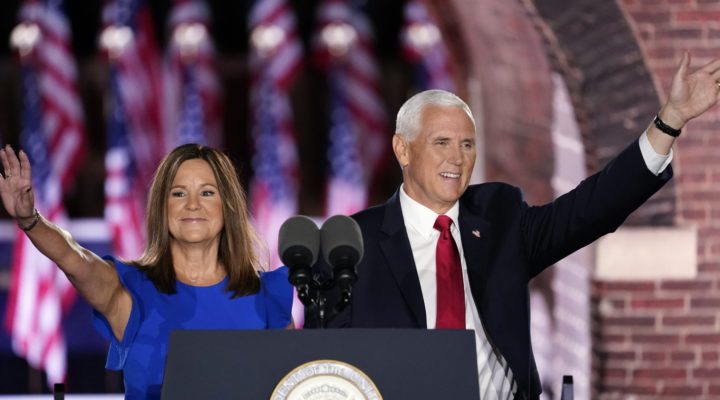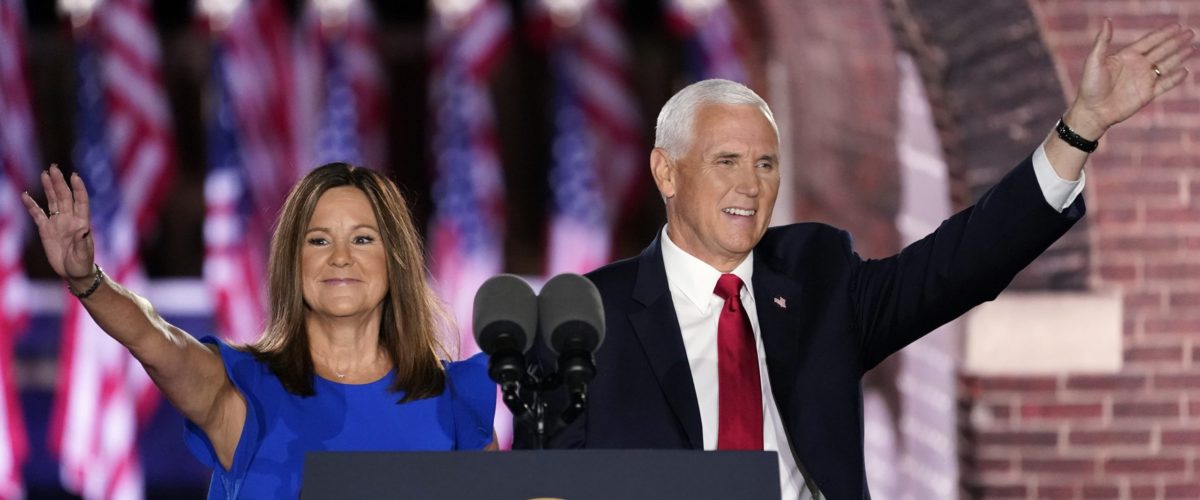“Let’s fix our eyes on Old Glory and all she represents …, let’s fix our eyes on the author and perfecter of our faith and freedom, and never forget that, ‘where the spirit of the Lord is, there is freedom,’ that means freedom always wins.”
So said Vice President Mike Pence during a live speech last week in the midst of the Republican National Convention.
And it’s nothing short of idolatry.

Taylor Mertins
I’ve heard, time and again, to keep politics out of the church. And, frankly, I sympathize with those who don’t want to hear about political proclivities from the pulpit. I sympathize with those who believe the United States of America was founded on the separation of church and state.
And yet, when a politician like Mike Pence stands and speaks in such a way to insert the church into the midst of the state I, a member and leader of the church, can no longer remain silent.
He literally swapped out Jesus for “Old Glory” and “this land of heroes.” Which is just another way of saying: Mike Pence put forth a theology in which America is synonymous with the kingdom of God.
Let the reader understand: Those things are truly mutually exclusive.
Back in July. I put up a short and to-the-point tweet about how American flags should not be present in church sanctuaries. I did so because America and the church are not the same thing, and when the flag is present next to the Cross (or next to the altar) it synthesizes those things together.
I have, for a long time, felt the dissonance between the flag and the Cross of Christ, and I have written about it at length on a number of occasions. That I feel so strongly is a result of the gospel’s insistence that our, that is Christians’, truest citizen can be found in heaven and that our truest freedom comes from Jesus, not the U.S. of A.
“When a politician like Mike Pence stands and speaks in such a way to insert the church into the midst of the state I, a member and leader of the church, can no longer remain silent.”
As of writing this post, that tweet about the flag in the sanctuary has been seen more than 750,000 times and more than 93,000 people have interacted with it.
The responses to the tweet, and to American nationalism within the realm of the church, were fairly predictable.
On one side, people were deeply offended by the thought of the flag being removed from the sanctuary (or now calling into question Mike Pence using the gospel as a political prop). I was implored to realize that the flag symbolizes sacrifice (a sacrifice akin to Christ’s?) and to take it away is unpatriotic (if not treasonous).
On the other side, people expressed their concern with the proximity of the flag to the worship of God (or now to it being used as a political mechanism in a speech). They remarked that we, who call ourselves Christians, cannot serve two masters (America and God), that God doesn’t belong to any particular nation state (despite what politicians might tell us), and that to conflate these two thing together is a remarkable American phenomenon (we, that is Americans, are some of the only people for whom putting the Cross near the flag is a regular occurrence).
In the last two weeks we, as a nation, have made it through both the Republican and Democratic national conventions. We’ve heard all about the importance of freedom and American exceptionalism but, for Christians, it’s vitally important to remember that our greatest freedom came long before George Washington, that our glory is far older than “Old Glory,” and that Jesus is not synonymous with the USA.
Our obsession with the flag and political ideologies is what Jesus calls idolatry.
The United States of America, whether we like to admit it or not, has far more in common with Rome than it does with the kingdom of God. We are the nation-state that Jesus offers his words of condemnation. We’re just too drunk on our own self-righteousness to notice.
Taylor Mertins is a United Methodist pastor in Woodbridge, Va., having earned degrees from James Madison University and Duke Divinity School. He regularly posts sermons, devotionals and other theological reflections at ThinkandLetThink.com, and he is the host of the “Strangely Warmed” lectionary podcast.


